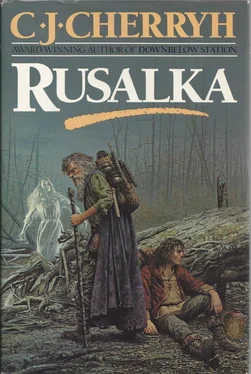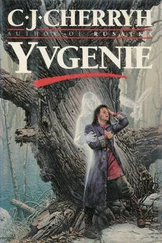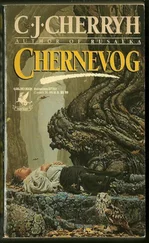EVESHKA… that was her name… talked on and on with the old man, much of the time in words too soft for Pyetr to hear above the patter of rain on the roof, but Pyetr watched her, all the same, and caught snatches of Uulamets’ answers—how the old man had feared she had drowned herself, or that she might have met some accident trying to run away; but no, Eveshka said…
“I was walking down along the river,” she said, in a soft, breathless voice, “and the vodyanoi caught me. I should have known him. I should never have listened. But he looked like a traveler…”
Odd, Pyetr thought. No one would expect travelers here… not for a hundred years.
But, he suddenly thought, the rusalka had killed the forest. The forest had been dead—how many years?
How old is she? How old is Uulamets himself? Could someone like him have a daughter so young?
“…and I came too close,” Eveshka said in her soft, lilting voice, calmly telling things that would make a grown man blanch. She was so calm—like a tsarina, he thought: a face like that, hands like that, feet like that, should be set off with cloth of gold and jewels; but she wore only a thin white dress with ragged, dirty sleeves. “He asked my help, I was a fool, and he suddenly showed his real shape and wrapped me up in his coils. The next thing I knew I was in the river. I breathed the water. That was all.”
Uulamets hugged his daughter. Liar, Pyetr thought sullenly, hearing the crotchety old man whisper that he loved her very much, truly he did. If his own dice-loving father had ever hugged him and said he missed him in that adoring tone of voice, he would have been sure his father was up to no good. The present spate of endearments from Uulamets made his flesh crawl.
But he felt a little gnawing doubt of his own judgment, Ilya Kochevikov having been no good example of a father—and he felt the old resentment for that mixing in all his other feelings about Uulamets, and in his new reckonings about what might have happened to the girl…
How long ago?
Who was her mother, anyway?
“I knew,” Eveshka said, her head on Uulamets’ shoulder, “that if anyone could help me, you could. I so much wanted to tell you I was sorry. I kept thinking… the last thing I’d ever done in this world was quarrel with you, and all through these years, I could see you come and go in the forest and I could watch you working in the yard—oh, I was there! And I couldn’t even tell you I was sorry—”
She began to cry again. “Hush, hush, hush,” Uulamets said, and stroked her hair and rocked her.
So much tenderness was acutely embarrassing. Pyetr found interest in the wood grain of the table in front of him, and in the firelight on the metal of the sword. He earnestly wished the house afforded somewhere else to go, and likely Sasha wished the same; but there was no such refuge. He would get up himself and rattle around pouring himself a drink and then ask the girl his own morbid questions—except she looked distraught, and where things might go with her then was too uncertain. She might take offense, and that certainly was not what he wanted—although he was far from sure precisely what he wanted from a dead girl whose bones he might well have touched this morning. It was altogether outside his experience.
So he sat still, beside Sasha, who was quite mouselike quiet, until Uulamets proposed his daughter was surely tired and might want to rest.
“I’m sure these young gentlemen won’t mind giving up the hearth,” Uulamets said. “You’ll sleep in your own bed tonight—”
Pyetr inclined his head with some dignity; Sasha attempted to rise and make a bow, inside the limits of the bench as Eveshka looked at them, shyly lowered her eyes and said Thank you in a soft voice that could well get possession of more than a spot by the fire.
Uulamets went to his bed and began dragging another cot from under it. Sasha clambered over the bench and went to help him. Pyetr simply sat still at the table and watched Eveshka watching them, all white and gold, standing there in front of the fireplace, with her hair—dry now—floating around her like the light itself.
He reminded himself sternly then of Kiev, and of the certain fact that Uulamets would in no wise allow a man near the girl, particularly considering Uulamets’ estimate of him. Doubtless this dispossession from the hearthside was Uulamets’ signal to them both that he was quite ready to see their backs.
So they might set out down the river tomorrow with no thanks and probably cheated of half the provisions they had bargained for—and won!—while the old skinflint kept a girl like her locked away in a dying forest…
No matter that the condition of the forest was in some measure her fault. She was certainly no ghost now.
Was she not?
A sane man at least had to think the thought, as he began bedding down in the dark corner beyond the table.
“Do you suppose she’s safe?” he whispered to Sasha in the faintest of voices as he lay down to sleep. It seemed to him if Sasha had wizardry talents he might be more sensitive to such things.
“What do you mean?” Sasha whispered back. So much, he thought, for wizardly sensitivity.
“Nothing,” he said, and pulled the quilt over his head, exhausted and determined to sleep, entertaining himself with thoughts of Eveshka.
But immediately as he shut his eyes his traitorous mind conjured instead the sudden drop into the pit at the knoll; and when he banished that memory, gave him the cave and the vodyanoi’s soft body wrapping around him—none of which promised pleasant dreams or a restful night.
Doggedly he remembered Eveshka by firelight, which chased the dark to the far edges of his mind.
Until his imagination, sly beast that it was, came around to Eveshka’s image on the river, and the touch of her cold fingers—and then, by unpleasant surprise, brought back the feeling of the bones in the cavern mud.
So, well, but even as a ghost, Pyetr told himself, putting his unruly imagination to rout again, Eveshka had hardly done him harm, a little cold water on his face, a scowl and a retreat—which he could now attribute to her desperate frustration rather than to any anger directed at him: she had tried so hard to speak, always without a sound. She had tried, there by the willow that was her tree—
The cave came back, perniciously. He heard the vodyanoi saying, “Best three out of five,” with his father’s voice, which he reckoned was less prophetic than the fact that he had been recollecting his father with unusual clarity this evening.
Back to the fire, then, and Eveshka: his thoughts kept going in circles, and he sincerely wanted to put all of it away and get some sleep—but with darker and darker images beginning to drift through his eyes when they were shut, he decided he had rather stay awake awhile. Unlikely things seemed to have happened to him with such persistence these last few days that nothing seemed quite safe: his mind was all a-boü with sights it refused to reconcile, and he was beginning to have a great difficulty telling the imaginary from the real.
He was not, tonight, with a dead girl dreaming by the hearth and his whole body aching from the battering of the vodyanoi in the cave, entirely certain that he was in control of his life any longer, and he found that a very upsetting idea.
He could go away from here, he and Sasha could just walk away in the morning with no one to stop them (granted they kept an eye to the river), and two or three days after this he would be able to wonder again if he had ever seen a rusalka or a dvorovoi, or wrestled with a River-thing.
But of nights—
For the rest of his life, he feared he was going to dream about things he did not understand, His confidence and his courage were the only assets he had ever had in life, the fact that Pyetr Kochevikov would make a try while everyone else was hesitating. For a man who had a knowledge of the odds for his only inheritance from his father, the existence of unknowables and uncertainties threaded through every situation was a terrible revelation.
Читать дальше







